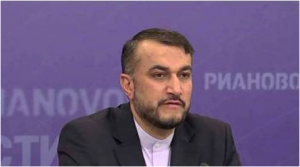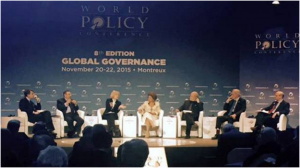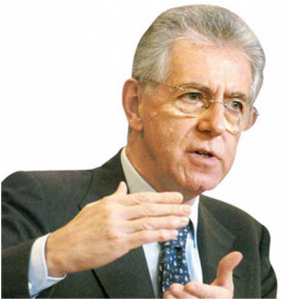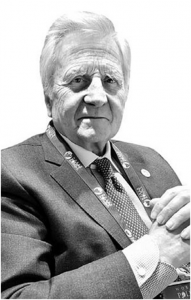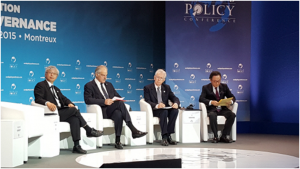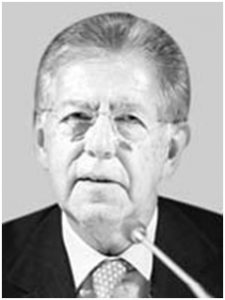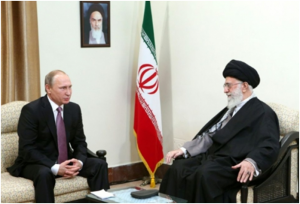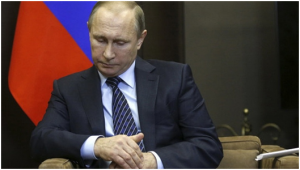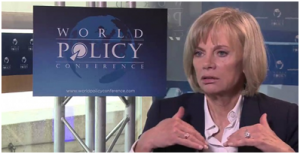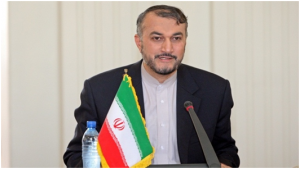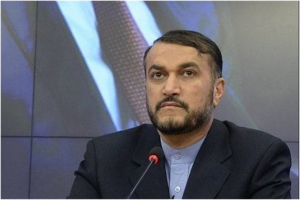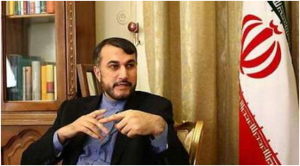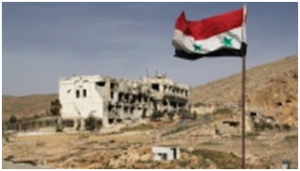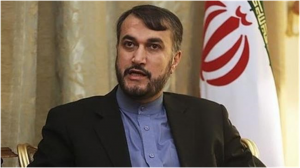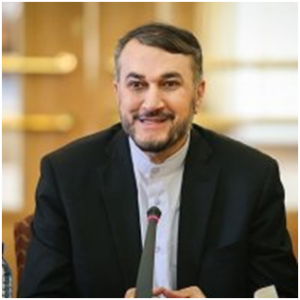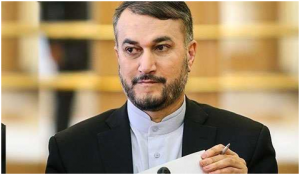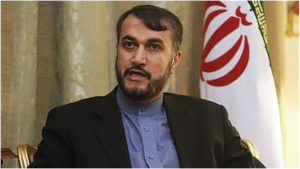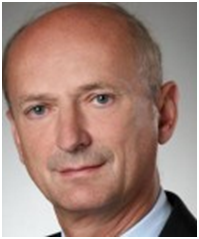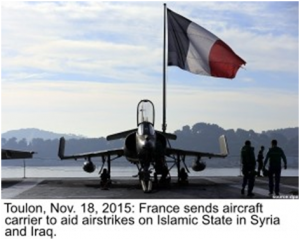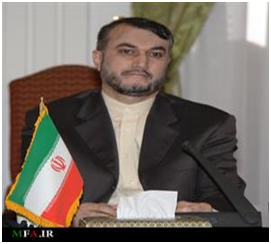24.11.15
Hossein Amirabdollahian.Michel TOUMA | OLJ
Le rôle de l’Iran, et dans son sillage du Hezbollah et des autres alliés de Téhéran, a été maintes fois évoqué lors de la 8e édition de la World Policy Conference qui a clôturé ses travaux dimanche à Montreux, en Suisse.
Les organisateurs de la WPC ont invité le vice-ministre iranien des Affaires étrangères, chargé du département arabo-africain, Hossein Amirabdollahian, à exposer dans ce cadre la politique de Téhéran au Moyen-Orient. En sa qualité de modérateur de cette session de travail, le président de la WPC, Thierry de Montbrial, a annoncé la couleur, d’entrée de jeu, en posant le problème de la crise de confiance qui marque les rapports entre la République islamique iranienne et l’Occident.
Éludant la question, le vice-ministre iranien a commencé son exposé – écrit – en soulignant que le Moyen-Orient traverse « une période de transition qui se traduit par le fait que nous passons de l’ancienne perception de la sécurité à un nouvel ordre ». « Cette période de transition impose une nouvelle politique sécuritaire, a affirmé Hossein Amirabdollahian. Il faut prendre en considération les événements de ces dernières années, en rapport notamment avec les conséquences des soulèvements arabes, plus particulièrement au niveau du terrorisme. Daech illustre le danger auquel le monde est confronté. Le principal danger à cet égard réside dans le risque que certaines organisations terroristes se transforment en gouvernements terroristes. Le terrorisme instrumentalise les populations, ce qui provoque la situation délétère à laquelle est confrontée la région. »
Affirmant qu’il n’existe « aucun rapport entre la religion et le terrorisme » et que « la religion est instrumentalisée » sur ce plan, le responsable iranien a souligné que la riposte à la recrudescence du terrorisme devrait se faire par des moyens militaires, certes, mais elle devrait aussi englober le développement socio-économique ainsi que la lutte contre la pauvreté. M. Amirabdollahian a préconisé dans ce cadre une coopération internationale, « car il faut affronter ce problème ensemble ».
Se lançant ensuite dans la langue de bois de la position officielle iranienne, l’intervenant a repris les thèses traditionnelles de Téhéran concernant les problèmes de la région, se livrant à ce propos à des critiques acerbes à l’égard de l’Arabie saoudite, du Qatar, de la Turquie et d’Israël. Il a stigmatisé dans ce contexte le refus de reconnaître les droits humains de la population palestinienne, « ce qui a suscité un accroissement du radicalisme ». M. Amirabdollahian a par ailleurs souligné qu’après la conclusion de l’accord sur le nucléaire iranien, « le moment est venu de réclamer le désarmement d’Israël, auquel dont s’atteler la communauté internationale ».
Les principes de la position iranienne
Évoquant le dossier du terrorisme, le vice-ministre iranien a affirmé que « sans une détermination collective et une coopération internationale, on ne pourra pas lutter contre le terrorisme », dénonçant le fait que « le radicalisme se soit propagé en Syrie, au Yémen et en Irak ». « Nous stigmatisons l’attitude barbare des groupes terroristes qui tuent femmes et enfants », a déclaré M. Amirabdollahian, qui a avancé une série de principes définissant la position officielle de Téhéran concernant les crises qui ébranlent le Moyen-Orient : « L’Iran estime que les crises régionales ne peuvent pas être réglées par les voies militaires, car cela ne ferait qu’accroître l’extrémisme ; toutes les sources de financement du terrorisme doivent être éliminées, car elles aboutissent à l’acquisition d’armes ; l’Iran estime que la sécurité de ses voisins est importante et nous espérons que les pays de la région accepteront le dialogue et la solution politique ; l’Arabie saoudite ne doit pas mettre en danger la sécurité de la Syrie, de l’Irak et la Libye pour préserver sa sécurité ; l’Iran condamne l’intervention étrangère au Yémen ; nous souhaitons que les pays voisins contribuent à la lutte contre le terrorisme. »
Le responsable iranien a conclu son exposé écrit en soulignant qu’un « démembrement de l’Iran provoquerait un chaos dans la région ».
La réponse de l’Iran à la crise de confiance
Ouvrant le débat au terme de l’intervention de M. Amirabdollahian, M. Thierry de Montbrial est revenu sur le problème de la crise de confiance qui marque les rapports entre la République islamique iranienne, d’une part, et les pays occidentaux, Israël et l’Arabie saoudite « qui estime que sa survie est en question », d’autre part. « Comment rétablir la confiance », a demandé M. de Montbrial.
Répondant à la question du président de la WPC, le vice-ministre iranien a déclaré, imperturbable : « Au cours des trente dernières années, depuis la révolution islamique, nous avons déployé d’intenses efforts pour assurer la stabilité et la sécurité dans la région. Le rôle de l’Iran a été dans ce cadre très constructif. Nous avons eu des approches positives pour combattre le terrorisme et l’Iran a joué un rôle très important dans la région, d’où le fait que nous avons envoyé de hauts responsables et des conseillers en Irak et en Syrie. L’Arabie saoudite, le Qatar et la Turquie n’ont pris aucune mesure pour combattre Daech. Au contraire, certains services de renseignements ont établi des rapports avec l’État islamique. Il est temps que ces pays rendent des comptes aux peuples de la Syrie et de l’Irak ».
Et de poursuivre sur sa lancée : « Certains ont soutenu des groupes terroristes pour combattre Bachar el-Assad et soutenir les sunnites en Iran. L’Iran joue un rôle très positif en luttant contre le terrorisme. L’Arabie saoudite utilise la force pour régler les problèmes de la région. Si nous agissons ensemble, nous pourrons lutter contre le terrorisme, mais certains pays ont fait de mauvais choix pour combattre Bachar el-Assad. La situation actuelle résulte des erreurs stratégiques commises par certaines instances internationales et régionales. Le terrorisme cherche à frapper tout le monde. Nous devons donc déployer tous les efforts possibles pour que l’Iran puisse jouer un rôle positif. » M. Amirabdollahian a souligné dans ce cadre qu’en Syrie, l’Iran a envoyé « des conseillers, alors que le Hezbollah assure la sécurité aux frontières en coopération avec le gouvernement central ».
Le vice-ministre iranien a reproché en outre aux pays européens de « ne parler que de Daech, alors que Daech n’est pas le seul groupe terroriste ». « Il existe en Syrie, a-t-il précisé à ce sujet, une quarantaine d’organisations terroristes, telles que Qaëda, al-Nosra, Ahrar el-Cham, Daech islamique, etc. Certaines d’entre elles se sont déployées au sud du Yémen. Par conséquent, pour combattre le terrorisme, il faut une action politique commune et une action sur le terrain, car autrement ils vont s’étendre en Europe et à Moscou. En Irak, la priorité des États-Unis a été d’éradiquer un seul groupe terroriste, alors qu’il y en avait d’autres. »
Et M. Amirabdollahian de conclure en appelant l’Europe à « prendre conscience du fait qu’il existe de nombreux groupes terroristes autres que Daech, notamment au sud du Yémen ».

